The BASIS International & Bilingual Schools China – Berkeley Global program launched in the fall of 2021 and connects middle and high school students with opportunities to engage with University of California, Berkeley’s challenging curriculum and world-class faculty, as well as develop connections across the ecosystem of the Bay Area and Silicon Valley. This partnership also provides qualified high school and university teachers with an unprecedented opportunity to join an experienced team of educators who develop and deliver Berkeley course experiences at the forefront of educational innovation, while collaborating with distinguished faculty at UC Berkeley to deliver courses onsite in China.
BASIS International & Bilingual Schools China (BIBSC) students in the Berkeley Global program select a content strand and enroll in college-level courses as early as eighth grade. Over successive years, they progress through increasingly advanced courses, mastering key skills in a given area through hands-on learning experiences.
By eleventh and twelfth grade, students are prepared for advanced academic pursuits, whether building artificial intelligence programs in a computer science course or conducting and presenting original research in a psychology course. Students can also earn UC Berkeley Extension credits for the upper-level courses they take.
Current offerings at our campuses in Shenzhen, Guangzhou, Park Lane Harbour and Hangzhou include strands in entrepreneurship, computer science and psychology. Each strand is developed and supervised by an experienced Berkeley Academic Director with deep academic expertise in their field.
Read on for more from our instructors about their course offerings, projects, and experience.
Entrepreneurship at BASIS International School Shenzhen
From entrepreneurship teacher Mr. Timothy Freeman
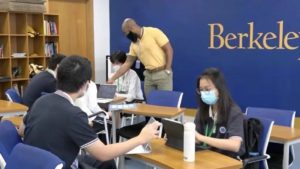
The Entrepreneurship and Innovation strand provides students the opportunity to engage with contemporary approaches, frameworks, and processes used in Silicon Valley and other top entrepreneurial hubs. The second course in the strand, Entrepreneurship Finance and Marketing, provides an in-depth investigation of topic areas essential to entrepreneurial success in a competitive startup world. Students build skills in marketing (including branding and go-to-market plans) and startup finance (including developing financial projections and venture capital). Additionally, students gain a deeper understanding of product/market fit and storytelling/pitching techniques.
Entrepreneurs can engineer the success of a startup by using the Lean Startup method, a scientific approach to creating and managing startups and getting the desired product into customers’ hands faster. In the video above, students apply the Lean Startup method to conduct Customer Discovery. In this module, students learned frameworks and techniques to understand their target customers’ situations, needs, and pain points. These skills and tools help entrepreneurs create a product or service that is more aligned with their target customers’ goals, significantly increasing the probability of the success of their business venture.
Students began the module by examining a case study about a startup that used customer discovery techniques to create a product a customer is willing and able to buy. Then, they completed assignments related to the case study that addressed core concepts for conducting an effective customer discovery interview and how to gain insight from the data collected. Students gained a deeper insight into the successes and failures of a real-world startup’s customer discovery journey, along with developing skillsets and tools necessary to complete customer discovery interviews on their own.
Next, students got out of the classroom and started talking with potential customers to understand their needs, test their assumptions, and ultimately build the customer persona of their target market. Students created question guides for their customer discovery interviews that effectively and efficiently achieve this objective. They then learned how personas help entrepreneurs focus their startups on customer needs to increase the likelihood of a successful startup venture. While testing their assumptions, students had to actively listen and empathize with their interviewees to gain insights to validate or invalidate their assumptions about their target market.
Finally, students learned how to organize and create professional presentations to report findings and insights from customer discovery interviews.
Computer Science at BASIS International School Guangzhou
From computer science teacher Mr. Jason Castaldo
The Computer Science and Coding strand introduces students to powerful ideas in computer science. Students develop skills in application development and software design, and build programs to address real-world problems. The first course in the strand, Foundations of Computer Science, is derived from the CS10 course at the University of California, Berkeley. In this course, students explore foundational computer science concepts while learning about the positive and negative impacts of computing on their lives.
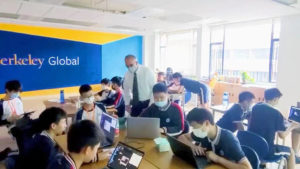
The concept of functional programming was exemplified in our first project, Wordmatch, in which students built a basic matching slots function that provides feedback as the game player attempts to guess a code. This function only reports matching slots, while a game runner script controls the game flow. While multiple approaches to coding the function exist, students implement loops and concatenation as learned by completing small tasks within coding labs.
Once the matching slots function is complete, students use their experience from building a “Guess a Number from 1 to n” game to build a game runner script that prompts the player to continue guessing until all slots match. The benefit of this approach, in contrast to this being done in a single script, is that students can test the matching slots block without running the entire program, in turn also making the program easier to debug and implement overall.
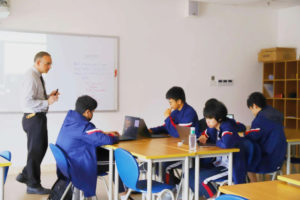
In closing, Foundations of Computer Science prepares students for more advanced studies in computer science. It helps them decompose problems to make them easier to solve. It helps them develop critical thinking and problem-solving skills. And most importantly, it empowers them to utilize programming to solve problems in any field of study.
Psychology at BASIS International School Park Lane Harbour
From psychology teacher Ms. Ryan Averill
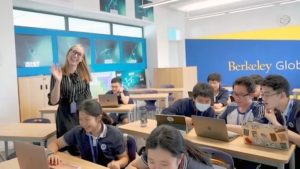
The Psychology and Sociology Research strand focuses on understanding human and group behavior within societies. Students acquire skills in research methods and data analysis that prepare them to conduct social-science research. In the second course of the strand, Principles of Developmental Psychology, the class is learning about the entire lifespan of human development, from being in the womb until very old age. Currently students are learning about toddlerhood, from two to four years old. One exciting aspect of these lessons is learning about methods that are most beneficial to help toddlers grow and develop cognitively, emotionally, and physically.
Recently, the students watched a lecture from Dr. Tsang at the University of California, Berkeley, about ways to help improve children’s self-control and empathy and how to best discipline them. Tsang discussed how parents, even in their daily lives, can model self-control and emotionally intelligent behaviors for children. He introduced the induction method, a form of discipline in which the parent calmly helps their child understand what they did wrong, why it was wrong, why they did it, how it affected other people, and how best to change their behavior. Parents can use this method with children as young as two-years old. Children who are mainly disciplined through this method show greater increases in empathy, self-control, honesty, and helpful behavior compared to other discipline methods.
To learn the induction method, students worked with partners to write scenes in which a parent uses induction to discipline a child. As they wrote the script, they had to decide what the toddler did wrong (e.g. taking another child’s toy without asking), why the child did that behavior (e.g. the child was jealous but also felt like they didn’t like any of their toys), why it was wrong (e.g. the other child was really sad, plus the child wouldn’t like it if someone else took their toy without asking), and ask what the child can do in the future instead (e.g. ask the child first, or both children play with the toy at the same time).
After preparing the scripts, the students acted out the scenes in front of the class. In one scene, a daughter crashed another child’s toy car. The mother calmly explained why the other child was upset and asked her daughter how she would feel if someone destroyed her toy. In the end, the daughter understood how the other child felt.
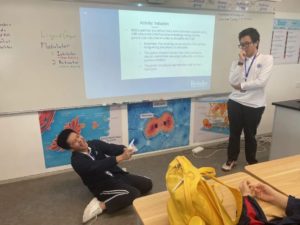
By observing their classmate’s scenes, students learned how others might approach induction. Many realized that this method requires patience, especially with easily distracted toddlers. Some also realized that induction combined with firm correction, such as a timeout for five minutes, might work best for toddlers who are fearless and impulsive.
The results were both hilarious and informative. The students really began to understand how to best talk to young children, the best ways to help children develop emotionally, and just how hard it is to be a parent.
Computer Science at BASIS International School Hangzhou
From computer science teacher Mr. Maruthi Yerra
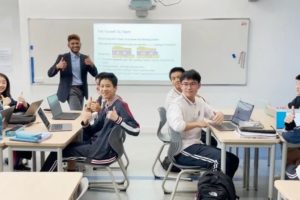
The Computer Science and Coding strand introduces students to powerful ideas in computer science. Students develop skills in application development and software design and build programs to address real-world problems. The first course in the strand, Foundations of Computer Science is derived from the CS10 course at the University of California, Berkeley. In this course, students explore foundational computer science concepts while learning about the positive and negative impacts of computing on their lives. This course helps students decompose problems to make them easier to solve while developing critical thinking and problem-solving skills. And most important, it empowers them to utilize programming to solve problems in any field of study.
In their first project, students coded a program to run Word Match, a color-based code-guessing game for two human players. In the game, the first player (Player 1) enters a 4-letter secret code, and the second player (Player 2) tries to guess that code. This back-and-forth will continue until Player 2 successfully guesses the secret code and the game ends.
Students all successfully completed the project and also accomplished extra credit components. One key to their success was collaboration: in teams, students shared ideas for completing individual projects.
Initially, students felt challenged as this is a college-level course. However, the adapted classroom structure model for computer science supported them in accomplishing the project. In daily class discussions, students shared different approaches to finishing the task. Additionally, students are always in different groups when working on labs so that they can share other ideas and approaches for problem-solving with their classmates, which simulates a real team coding experience of larger software projects.
Visit our careers website for more information about the Berkeley Global Partnership.